Fleurs du Mal Magazine



Charles BAUDELAIRE (1821-1867)
La Mort des Pauvres
C’est la Mort qui console, hélas ! Et qui fait vivre ;
C’est le but de la vie, et c’est le seul espoir
Qui, comme un élixir, nous monte et nous enivre,
Et nous donne le cœur de marcher jusqu’au soir ;
À travers la tempête, et la neige, et le givre,
C’est la clarté vibrante à notre horizon noir ;
C’est l’auberge fameuse inscrite sur le livre,
Où l’on pourra manger, et dormir, et s’asseoir ;
C’est un Ange qui tient dans ses doigts magnétiques
Le sommeil et le don des rêves extatiques,
Et qui refait le lit des gens pauvres et nus ;
C’est la gloire des dieux, c’est le grenier mystique,
C’est la bourse du pauvre et sa patrie antique,
C’est le portique ouvert sur les Cieux inconnus !
La Mort des Artistes
Combien faut-il de fois secouer mes grelots
Et baiser ton front bas, morne caricature ?
Pour piquer dans le but, de mystique nature,
Combien, ô mon carquois, perdre de javelots ?
Nous userons notre âme en de subtils complots,
Et nous démolirons mainte lourde armature,
Avant de contempler la grande Créature
Dont l’infernal désir nous remplit de sanglots !
Il en est qui jamais n’ont connu leur Idole,
Et ces sculpteurs damnés et marqués d’un affront,
Qui vont se martelant la poitrine et le front,
N’ont qu’un espoir, étrange et sombre Capitole !
C’est que la Mort, planant comme un soleil nouveau,
Fera s’épanouir les fleurs de leur cerveau !
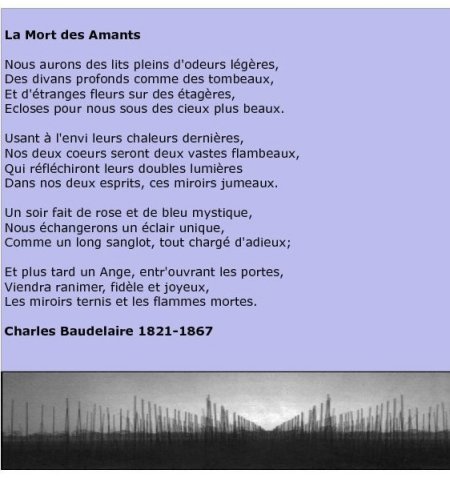
kemp=mag poetry magazine
More in: Baudelaire, Charles
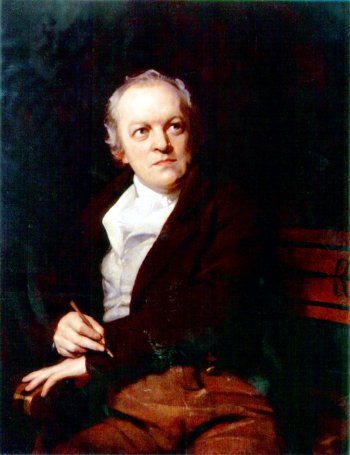
W i l l i a m B l a k e
(1757-1827)
NIGHT
The sun descending in the west,
The evening star does shine;
The birds are silent in their nest,
And I must seek for mine.
The moon, like a flower
In heaven’s high bower,
With silent delight,
Sits and smiles on the night.
Farewell, green fields and happy grove,
Where flocks have ta’en delight.
Where lambs have nibbled, silent move
The feet of angels bright;
Unseen they pour blessing,
And joy without ceasing,
On each bud and blossom,
And each sleeping bosom.
They look in every thoughtless nest
Where birds are covered warm;
They visit caves of every beast,
To keep them all from harm:
If they see any weeping
That should have been sleeping,
They pour sleep on their head,
And sit down by their bed.
When wolves and tigers howl for prey,
They pitying stand and weep;
Seeking to drive their thirst away,
And keep them from the sheep.
But, if they rush dreadful,
The angels, most heedful,
Receive each mild spirit,
New worlds to inherit.
And there the lion’s ruddy eyes
Shall flow with tears of gold:
And pitying the tender cries,
And walking round the fold:
Saying: "Wrath by His meekness,
And, by His health, sickness,
Are driven away
From our immortal day.
"And now beside thee, bleating lamb,
I can lie down and sleep,
Or think on Him who bore thy name,
Graze after thee, and weep.
For, washed in life’s river,
My bright mane for ever
Shall shine like the gold,
As I guard o’er the fold.
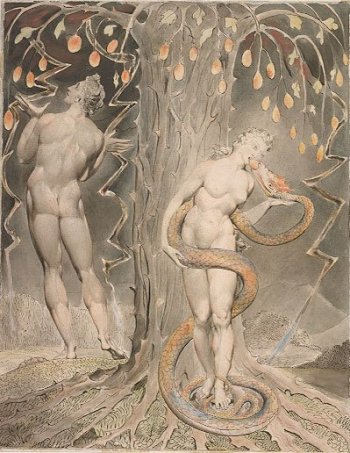
LONDON
I wandered through each chartered street,
Near where the chartered Thames does flow,
A mark in every face I meet,
Marks of weakness, marks of woe.
In every cry of every man,
In every infant’s cry of fear,
In every voice, in every ban,
The mind-forged manacles I hear:
How the chimney-sweeper’s cry
Every blackening church appalls,
And the hapless soldier’s sigh
Runs in blood down palace-walls.
But most, through midnight streets I hear
How the youthful harlot’s curse
Blasts the new-born infant’s tear,
And blights with plagues the marriage-hearse.
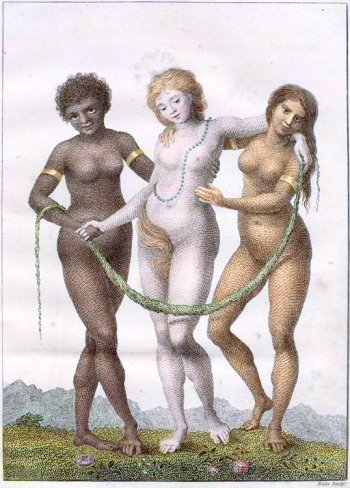
A Dream
Once a dream did weave a shade
O’er my angel-guarded bed,
That an emmet lost its way
Where on grass methought I lay.
Troubled, wildered, and forlorn,
Dark, benighted, travel-worn,
Over many a tangle spray,
All heart-broke, I heard her say:
‘Oh my children! do they cry,
Do they hear their father sigh?
Now they look abroad to see,
Now return and weep for me.’
Pitying, I dropped a tear:
But I saw a glow-worm near,
Who replied, ‘What wailing wight
Calls the watchman of the night?
‘I am set to light the ground,
While the beetle goes his round:
Follow now the beetle’s hum;
Little wanderer, hie thee home!’
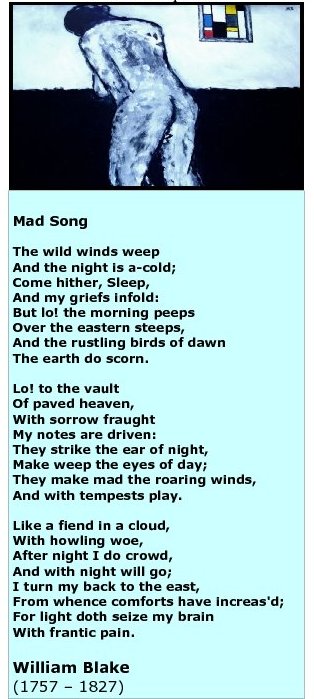
More in: Blake, William
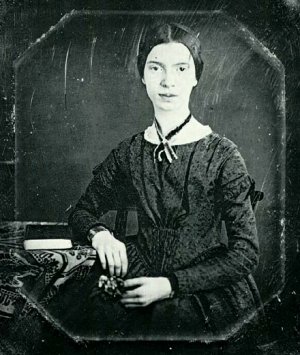
E m i l y D i c k i n s o n
(1830-1886)
FORBIDDEN FRUIT I
Forbidden fruit a flavor has
That lawful orchards mocks;
How luscious lies the pea within
The pod that Duty locks!
FORBIDDEN FRUIT II
Heaven is what I cannot reach!
The apple on the tree,
Provided it do hopeless hang,
That ‘heaven’ is, to me.
The color on the cruising cloud,
The interdicted ground
Behind the hill, the house behind, —
There Paradise is found!
DROWNING IS NOT SO PITIFUL
Drowning is not so pitiful
As the attempt to rise.
Three times, ‘t is said, a sinking man
Comes up to face the skies,
And then declines forever
To that abhorred abode
Where hope and he part company, —
For he is grasped of God.
The Maker’s cordial visage,
However good to see,
Is shunned, we must admit it,
Like an adversity.
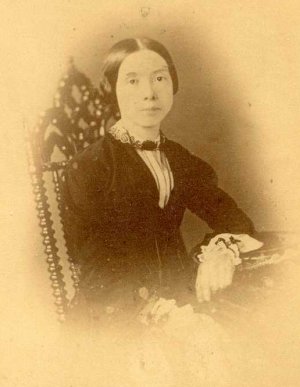
THE INEVITABLE
While I was fearing it, it came,
But came with less of fear,
Because that fearing it so long
Had almost made it dear.
There is a fitting a dismay,
A fitting a despair.
‘Tis harder knowing it is due,
Than knowing it is here.
The trying on the utmost,
The morning it is new,
Is terribler than wearing it
A whole existence through.
HEART, WE WILL FORGET HIM
Heart, we will forget him!
You and I, to-night!
You may forget the warmth he gave,
I will forget the light.
When you have done, pray tell me,
That I my thoughts may dim;
Haste! lest while you’re lagging,
I may remember him!

The Brain is wider than the Sky
The Brain—is wider than the Sky—
For—put them side by side—
The one the other will contain
With ease—and You—beside—
The Brain is deeper than the sea—
For—hold them—Blue to Blue—
The one the other will absorb—
As Sponges—Buckets—do—
The Brain is just the weight of God—
For—Heft them—Pound for Pound—
And they will differ—if they do—
As Syllable from Sound—
Emily Dickinson
(1830-1886)
More in: Dickinson, Emily
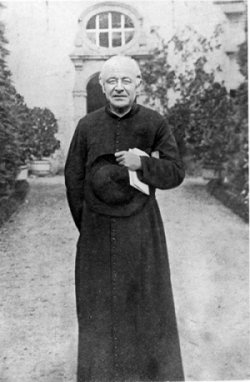
G u i d o G e z e l l e
(1830-1899)
ALS DE ZIELE LUISTERT
Als de ziele luistert
spreekt het al een taal dat leeft,
‘t lijzigste gefluister
ook een taal en teken heeft:
blaren van de bomen
kouten met malkaar gezwind,
baren in de stromen
klappen luide en welgezind,
wind en wee en wolken,
wegelen van Gods heiligen voet,
talen en vertolken
‘t diep gedoken Woord zo zoet…
als de ziele luistert!
(1859)
DIEN AVOND EN DIE ROOZE
‘k Heb menig uur bij u
gesleten en genoten,
en nooit en heeft een uur met u
me een enklen stond verdroten.
‘k Heb menig menig blom voor u
gelezen en geschonken,
en, lijk een bie, met u, met u,
er honing uit gedronken;
maar nooit een uur zo lief met u,
zoo lang zij duren koste,
maar nooit een uur zoo droef om u,
wanneer ik scheiden moste,
als de uur wanneer ik dicht bij u,
dien avond, neêrgezeten,
u spreken hoorde en sprak tot u
wat onze zielen weten.
Noch nooit een blom zo schoon, van u
gezocht, geplukt, gelezen,
als die dien avond blonk op u,
en mocht de mijne wezen!
Ofschoon, zoo wel voor mij als u,
– wie zal dit kwaad genezen? –
een uur bij mij, een uur bij u
niet lang een uur mag wezen;
ofschoon voor mij, oschoon voor u,
zoo lief en uitgelezen,
die rooze, al was ‘t een roos van u,
niet lang een roos mocht wezen,
toch lang bewaart, dit zeg ik u,
‘t en ware ik ‘t al verloze,
mijn hert drie dierbre beelden: u
dien avond – en – die rooze!
(1858)

K ZAT BIJ NEN BOOM TE LEZEN
‘k Zat bij nen boom te lezen,
al in mijnen brevier;
de zunne kwam gerezen,
gelijk een kole vier;
de blijde vogels dronken
de dreupels van den mei,
de morgenperelen blonken
en brandden in de wei,
lijk vier:
‘k zat bij nen boom te lezen,
al in mijnen brevier!
(1860?)
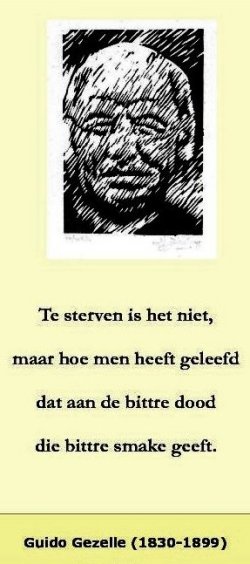
lino: Rolf Janssen
More in: Gezelle, Guido, Guido Gezelle
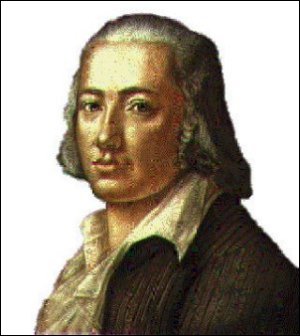
Friedrich Hölderlin
(1784-1843)
Dichterberuf
Des Ganges Ufer hörten des Freudengotts
Triumph, als allerobernd vom Indus her
Der junge Bacchus kam mit heilgem
Weine vom Schlafe die Völker weckend.
Und du, des Tages Engel! erweckst sie nicht,
Die jetzt noch schlafen? gib die Gesetze, gib
Uns Leben, siege, Meister, du nur
Hast der Eroberung Recht, wie Bacchus.
Nicht, was wohl sonst des Menschen Geschick und Sorg’
Im Haus und unter offenem Himmel ist,
Wenn edler, denn das Wild, der Mann sich
Wehret und nährt! denn es gilt ein anders,
Zu Sorg’ und Dienst den Dichtenden anvertraut!
Der Höchste, der ists, dem wir geeignet sind
Daß näher, immerneu besungen
Ihn die befreundete Brust vernehme.
Und dennoch, o ihr Himmlischen all und all
Ihr Quellen und ihr Ufer und Hain’ und Höhn
Wo wunderbar zuerst, als du die
Locken ergriffen, und unvergeßlich
Der unverhoffte Genius über uns
Der schöpferische, göttliche kam, daß stumm
Der Sinn uns ward und, wie vom
Strahle gerührt das Gebein erbebte,
Ihr ruhelosen Taten in weiter Welt!
Ihr Schicksalstag’, ihr reißenden, wenn der Gott
Stillsinnend lenkt, wohin zorntrunken
Ihn die gigantischen Rosse bringen,
Euch sollten wir verschweigen, und wenn in uns
Vom stetigstillen Jahre der Wohllaut tönt
So sollt’ es klingen, gleich als hätte
Mutig und müßig ein Kind des Meisters
Geweihte, reine Saiten im Scherz gerührt?
Und darum hast du, Dichter! des Orients
Propheten und den Griechensang und
Neulich die Donner gehört, damit du
Den Geist zu Diensten brauchst und die Gegenwart
Des Guten übereilest, in Spott, und den Albernen
Verleugnest, herzlos, und zum Spiele
Feil, wie gefangenes Wild, ihn treibest.
Bis aufgereizt vom Stachel im Grimme der
Des Ursprungs sich erinnert und ruft, daß selbst
Der Meister kommt, dann unter heißen
Todesgeschossen entseelt dich lässet.
Zu lang ist alles Göttliche dienstbar schon
Und alle Himmelskräfte verscherzt, verbraucht
Die Gütigen, zur Lust, danklos, ein
Schlaues Geschlecht und zu kennen wähnt es
Wenn ihnen der Erhabne den Acker baut
Das Tagslicht und den Donnerer, und es späht
Das Sehrohr wohl sie all und zählt und
Nennet mit Namen des Himmels Sterne
Der Vater aber decket mit heilger Nacht,
Damit wir bleiben mögen, die Augen zu.
Nicht liebt er Wildes! doch es zwinget
Nimmer die weite Gewalt den Himmel.
Noch ists auch gut, zu weise zu sein. Ihn kennt
Der Dank. Doch nicht behält er es leicht allein,
Und gern gesellt, damit verstehn sie
Helfen, zu anderen sich ein Dichter.
Furchtlos bleibt aber, so er es muß, der Mann
Einsam vor Gott, es schützet die Einfalt ihn,
Und keiner Waffen brauchts und keiner
Listen, so lange, bis Gottes Fehl hilft.
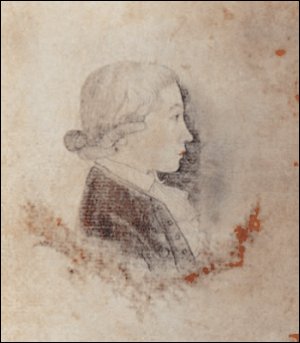
Dichtermut
Sind denn dir nicht verwandt alle Lebendigen,
Nährt die Parze denn nicht selber im Dienste dich?
Drum, so wandle nur wehrlos
Fort durchs Leben, und fürchte nichts!
Was geschiehet, es sei alles gesegnet dir,
Sei zur Freude gewandt! oder was könnte denn
Dich beleidigen, Herz! was
Da begegnen, wohin du sollst?
Denn, seitdem der Gesang sterblichen Lippen sich
Friedenatmend entwand, frommend in Leid und Glück
Unsre Weise der Menschen
Herz erfreute, so waren auch
Wir, die Sänger des Volks, gerne bei Lebenden
Wo sich vieles geselle, freudig und jedem hold,
Jedem offen; so ist ja
Unser Ahne, der Sonnengott,
Der den fröhlichen Tag Armen und Reichen gönnt,
Der in flüchtiger Zeit uns, die Vergänglichen,
Aufgerichtet an goldnen
Gängelbanden, wie Kinder, hält.
Ihn erwartet, auch ihn nimmt, wo die Stunde kömmt,
Seine purpurne Flut; sieh! und das edle Licht
Gehet, kundig des Wandels,
Gleichgesinnet hinab den Pfad.
So vergehe denn auch, wenn es die Zeit einst ist
Und dem Geiste sein Recht nirgend gebracht, so sterb’
Einst im Ernste des Lebens
Unsre Freude, doch schönen Tod!
More in: Hölderlin, Friedrich

EDGAR ALLAN POE poetry
Spirits Of The Dead
1
Thy soul shall find itself alone
‘Mid dark thoughts of the grey tomb-stone-
Not one, of all the crowd, to pry
Into thine hour of secrecy:
2
Be silent in that solitude,
Which is not loneliness- for then
The spirits of the dead, who stood
In life before thee, are again
In death around thee, and their will
Shall overshadow thee; be still.
3
The night, tho’ clear- shall frown-
And the stars shall not look down,
From their high thrones in the heaven
With light like Hope to mortals given-
But their red orbs, without beam,
To thy weariness shall seem
As a burning and a fever
Which would cling to thee for ever.
4
Now are thoughts thou shalt not banish-
Now are visions ne’er to vanish-
From thy spirit shall they pass
No more- like dew-drop from the grass.
5
The breeze, the breath of God, is still,
And the mist upon the hill
Shadowy – shadowy – yet unbroken,
Is a symbol and a token-
How it hangs upon the trees,
A mystery of mysteries! –
Edgar Allan Poe
(1809-1849)
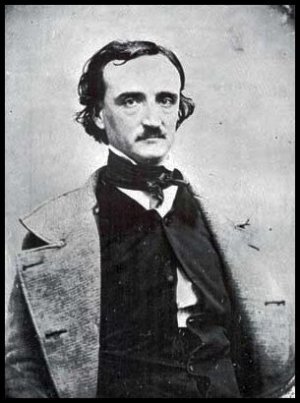
THE RAVEN
Once upon a midnight dreary, while I pondered, weak and weary,
Over many a quaint and curious volume of forgotten lore–
While I nodded, nearly napping, suddenly there came a tapping,
As of some one gently rapping–rapping at my chamber door.
"’Tis some visitor," I muttered, "tapping at my chamber door–
Only this and nothing more."
Ah, distinctly I remember, it was in the bleak December,
And each separate dying ember wrought its ghost upon the floor.
Eagerly I wished the morrow;–vainly I had sought to borrow
From my books surcease of sorrow–sorrow for the lost Lenore–
For the rare and radiant maiden whom the angels name Lenore–
Nameless here for evermore.
And the silken sad uncertain rustling of each purple curtain
Thrilled me–filled me with fantastic terrors never felt before;
So that now, to still the beating of my heart, I stood repeating
"’Tis some visitor entreating entrance at my chamber door–
Some late visitor entreating entrance at my chamber door;–
This it is and nothing more."
Presently my soul grew stronger; hesitating then no longer,
"Sir," said I, "or Madam, truly your forgiveness I implore;
But the fact is I was napping, and so gently you came rapping,
And so faintly you came tapping–tapping at my chamber door,
That I scarce was sure I heard you"–here I opened wide the door:–
Darkness there and nothing more.
Deep into that darkness peering, long I stood there wondering,
fearing,
Doubting, dreaming dreams no mortal ever dared to dream before;
But the silence was unbroken, and the darkness gave no token,
And the only word there spoken was the whispered word, "Lenore!"
This I whispered, and an echo murmured back the word, "Lenore!"
Merely this and nothing more.
Back into the chamber turning, all my soul within me burning,
Soon I heard again a tapping, somewhat louder than before.
"Surely," said I, "surely that is something at my window lattice;
Let me see, then, what thereat is, and this mystery explore–
Let my heart be still a moment, and this mystery explore;–
‘Tis the wind and nothing more."
Open here I flung the shutter, when, with many a flirt and flutter,
In there stepped a stately Raven of the saintly days of yore;
Not the least obeisance made he: not an instant stopped or stayed he;
But, with mien of lord or lady, perched above my chamber door–
Perched upon a bust of Pallas just above my chamber door–
Perched, and sat, and nothing more.
Then this ebony bird beguiling my sad fancy into smiling,
By the grave and stern decorum of the countenance it wore,
"Though thy crest be shorn and shaven, thou," I said, "art sure no
craven,
Ghastly grim and ancient Raven wandering from the Nightly shore–
Tell me what thy lordly name is on the Night’s Plutonian shore!"
Quoth the Raven, "Nevermore."
Much I marvelled this ungainly fowl to hear discourse so plainly,
Though its answer little meaning–little relevancy bore;
For we cannot help agreeing that no living human being
Ever yet was blessed with seeing bird above his chamber door–
Bird or beast upon the sculptured bust above his chamber door,
With such name as "Nevermore."
But the Raven, sitting lonely on that placid bust, spoke only
That one word, as if his soul in that one word he did outpour.
Nothing further then he uttered–not a feather then he fluttered–
Till I scarcely more than muttered, "Other friends have flown before–
On the morrow he will leave me, as my hopes have flown before."
Then the bird said, "Nevermore."
Startled at the stillness broken by reply so aptly spoken,
"Doubtless," said I, "what it utters is its only stock and store,
Caught from some unhappy master whom unmerciful Disaster
Followed fast and followed faster till his songs one burden bore–
Till the dirges of his Hope the melancholy burden bore
Of ‘Never–nevermore.’"
But the Raven still beguiling all my sad soul into smiling,
Straight I wheeled a cushioned seat in front of bird and bust and
door;
Then, upon the velvet sinking, I betook myself to linking
Fancy unto fancy, thinking what this ominous bird of yore–
What this grim, ungainly, ghastly, gaunt, and ominous bird of yore
Meant in croaking "Nevermore."
This I sat engaged in guessing, but no syllable expressing
To the fowl whose fiery eyes now burned into my bosom’s core;
This and more I sat divining, with my head at ease reclining
On the cushion’s velvet lining that the lamp-light gloated o’er,
But whose velvet violet lining with the lamp-light gloating o’er,
She shall press, ah, nevermore!
Then, methought, the air grew denser, perfumed from an unseen censer
Swung by Seraphim whose foot-falls tinkled on the tufted floor.
"Wretch," I cried, "thy God hath lent thee–by these angels he hath
sent thee
Respite–respite aad nepenthe from thy memories of Lenore!
Quaff, oh quaff this kind nepenthe, and forget this lost Lenore!"
Quoth the Raven, "Nevermore."
"Prophet!" said I, "thing of evil!–prophet still, if bird or devil!–
Whether Tempter sent, or whether tempest tossed thee here ashore,
Desolate yet all undaunted, on this desert land enchanted–
On this home by Horror haunted–tell me truly, I implore–
Is there– is there balm in Gilead?–tell me–tell me, I implore!"
Quoth the Raven, "Nevermore."
"Prophet!" said I, "thing of evil!–prophet still, if bird or devil!
By that Heaven that bends above us–by that God we both adore–
Tell this soul with sorrow laden if, within the distant Aidenn,
It shall clasp a sainted maiden whom the angels name Lenore–
Clasp a rare and radiant maiden whom the angels name Lenore."
Quoth the Raven, "Nevermore."
"Be that word our sign of parting, bird or fiend!" I shrieked,
upstarting–
"Get thee back into the tempest and the Night’s Plutonian shore!
Leave no black plume as a token of that lie thy soul hath spoken!
Leave my loneliness unbroken!–quit the bust above my door!
Take thy beak from out my heart, and take thy form from off my door!"
Quoth the Raven, "Nevermore."
And the Raven, never flitting, still is sitting, still is sitting
On the pallid bust of Pallas just above my chamber door;
And his eyes have all the seeming of a demon’s that is dreaming,
And the lamp-light o’er him streaming throws his shadow on the floor;
And my soul from out that shadow that lies floating on the floor
Shall be lifted–nevermore!
1845
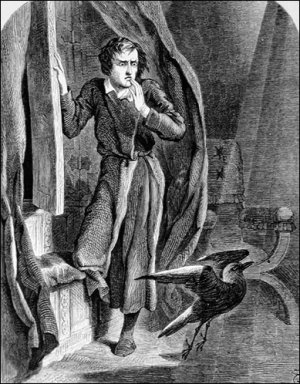
THE BELLS
I
Hear the sledges with the bells–
Silver bells!
What a world of merriment their melody foretells!
How they tinkle, tinkle, tinkle,
In their icy air of night!
While the stars, that oversprinkle All the heavens, seem to twinkle
With a crystalline delight;
Keeping time, time, time,
In a sort of Runic rhyme,
To the tintinnabulation that so musically wells
From the bells, bells, bells, bells,
Bells, bells, bells–
From the jingling and the tinkling of the bells.
II
Hear the mellow wedding bells, Golden bells!
What a world of happiness their harmony foretells!
Through the balmy air of night
How they ring out their delight!
From the molten golden-notes,
And all in tune,
What a liquid ditty floats
To the turtle-dove that listens, while she gloats
On the moon!
Oh, from out the sounding cells,
What a gush of euphony voluminously wells!
How it swells!
How it dwells
On the future! how it tells
Of the rapture that impels
To the swinging and the ringing
Of the bells, bells, bells,
Of the bells, bells, bells, bells,
Bells, bells, bells–
To the rhyming and the chiming of the bells!
III
Hear the loud alarum bells–
Brazen bells!
What a tale of terror now their turbulency tells!
In the startled ear of night
How they scream out their affright!
Too much horrified to speak,
They can only shriek, shriek,
Out of tune,
In a clamorous appealing to the mercy of the fire,
In a mad expostulation with the deaf and frantic fire
Leaping higher, higher, higher,
With a desperate desire,
And a resolute endeavor
Now–now to sit or never,
By the side of the pale-faced moon.
Oh, the bells, bells, bells!
What a tale their terror tells
Of Despair!
How they clang, and clash, and roar!
What a horror they outpour
On the bosom of the palpitating air!
Yet the ear it fully knows,
By the twanging,
And the clanging,
How the danger ebbs and flows;
Yet the ear distinctly tells,
In the jangling,
And the wrangling,
How the danger sinks and swells,
By the sinking or the swelling in the anger of the bells–
Of the bells–
Of the bells, bells, bells, bells,
Bells, bells, bells–
In the clamor and the clangor of the bells!
IV
Hear the tolling of the bells–
Iron bells!
What a world of solemn thought their monody compels!
In the silence of the night,
How we shiver with affright
At the melancholy menace of their tone!
For every sound that floats
From the rust within their throats
Is a groan.
And the people–ah, the people–
They that dwell up in the steeple.
All alone,
And who tolling, tolling, tolling,
In that muffled monotone,
Feel a glory in so rolling
On the human heart a stone–
They are neither man nor woman–
They are neither brute nor human–
They are Ghouls:
And their king it is who tolls;
And he rolls, rolls, rolls,
Rolls
A paean from the bells!
And his merry bosom swells
With the paean of the bells!
And he dances, and he yells;
Keeping time, time, time,
In a sort of Runic rhyme,
To the paean of the bells–
Of the bells:
Keeping time, time, time,
In a sort of Runic rhyme,
To the throbbing of the bells–
Of the bells, bells, bells–
To the sobbing of the bells;
Keeping time, time, time,
As he knells, knells, knells,
In a happy Runic rhyme,
To the rolling of the bells–
Of the bells, bells, bells–
To the tolling of the bells,
Of the bells, bells, bells, bells,
Bells, bells, bells–
To the moaning and the groaning of the bells.
1849
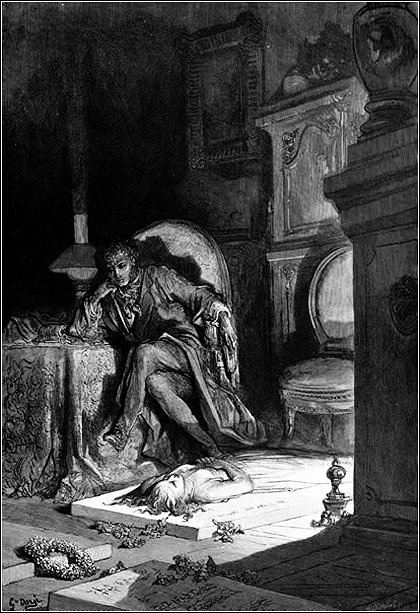
LENORE
Ah, broken is the golden bowl! the spirit flown forever!
Let the bell toll!–a saintly soul floats on the Stygian river.
And, Guy de Vere, hast thou no tear?–weep now or never more!
See! on yon drear and rigid bier low lies thy love, Lenore!
Come! let the burial rite be read–the funeral song be sung!–
An anthem for the queenliest dead that ever died so young–
A dirge for her, the doubly dead in that she died so young.
"Wretches! ye loved her for her wealth and hated her for her pride,
And when she fell in feeble health, ye blessed her–that she died!
How shall the ritual, then, be read?–the requiem how be sung
By you–by yours, the evil eye,–by yours, the slanderous tongue
That did to death the innocence that died, and died so young?"
Peccavimus; but rave not thus! and let a Sabbath song
Go up to God so solemnly the dead may feel no wrong!
The sweet Lenore hath "gone before," with Hope, that flew beside,
Leaving thee wild for the dear child that should have been thy bride–
For her, the fair and debonnaire, that now so lowly lies,
The life upon her yellow hair but not within her eyes–
The life still there, upon her hair–the death upon her eyes.
"Avaunt! to-night my heart is light. No dirge will I upraise,
But waft the angel on her flight with a paean of old days!
Let no bell toll!–lest her sweet soul, amid its hallowed mirth,
Should catch the note, as it doth float up from the damned Earth.
To friends above, from fiends below, the indignant ghost is riven–
From Hell unto a high estate far up within the Heaven–
From grief and groan to a golden throne beside the King of Heaven."
1844
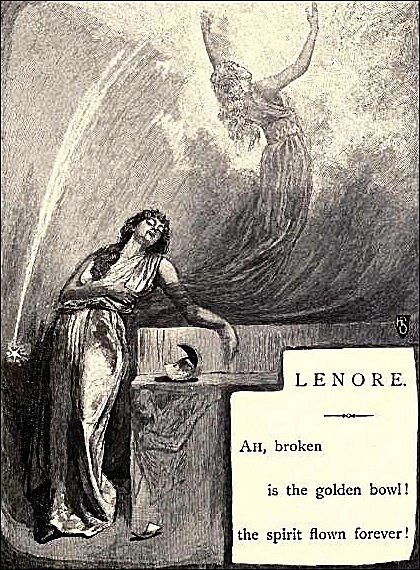

.jpg)
kemp=mag poetry magazine
More in: Edgar Allan Poe, Poe, Edgar Allan
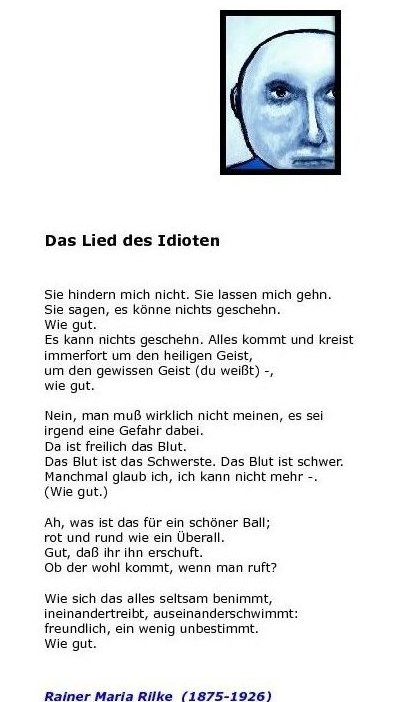
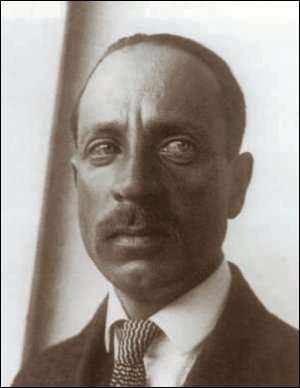
Herbsttag
Herr, es ist Zeit. Der Sommer war sehr groß.
Leg deinen Schatten auf die Sonnenuhren,
und auf den Fluren laß die Winde los.
Befiehl den letzten Früchten voll zu sein;
gib ihnen noch zwei südlichere Tage
dränge sie zur Vollendung hin und jage
die letzte Süße in den schweren Wein.
Wer jetzt kein Haus hat, baut sich keines mehr.
Wer jetzt allein ist, wird es lange bleiben,
wird wachen, lesen, lange Briefe schreiben
und wird in den Alleen hin und her
unruhig wandern, wenn die Blätter treiben.
(1902, uit: Das Buch der Bilder)
Die Liebenden
Sieh, wie sie zu einander erwachsen:
in ihren Adern wird alles Geist.
Ihre Gestalten beben wie Achsen,
um die es heiß und hinreißend kreist
Dürstende, und sie bekommen zu trinken,
Wache, und sieh: sie bekommen zu sehn.
Laß sie ineinander sinken,
um einander zu überstehn.
(1908, Paris)
Gesang der Frauen an den Dichter
Sieh, wie sich alles auftut: so sind wir;
denn wir sind nichts als solche Seligkeit.
Was Blut und Dunkel war in einem Tier,
das wuchs in uns zur Seele an und schreit
als Seele weiter. Und es schreit nach dir.
Du freilich nimmst es nur in dein Gesicht
als sei es Landschaft: sanft und ohne Gier.
Und darum meinen wir, du bist es nicht,
nach dem es schreit. Und doch, bist du nicht der,
an den wir uns ganz ohne Rest verlören?
Und werden wir in irgend einem mehr?
Mit uns geht das Unendliche vorbei.
Du aber sei, du Mund, daß wir es hören,
du aber, du Uns-Sagender: du sei.
Aus: Neue Gedichte (1907)
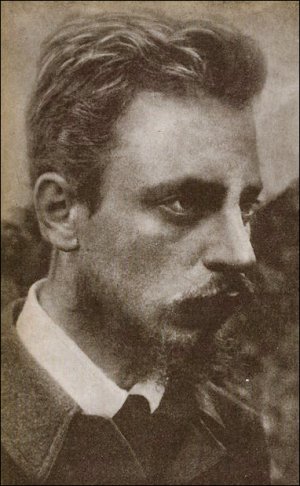
Rainer Maria Rilke
(1875-1926)
fleursdumal.nl magazine
More in: Archive Q-R, Rilke, Rainer Maria
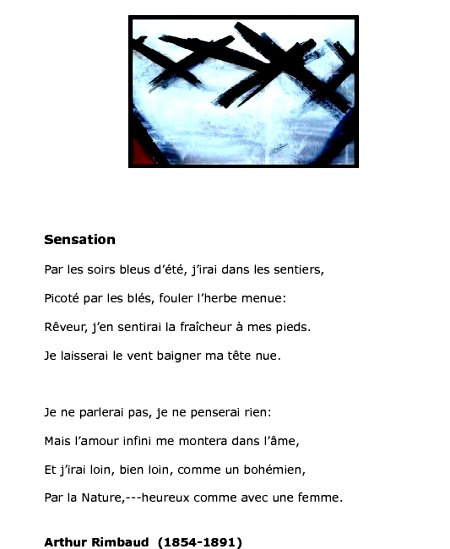
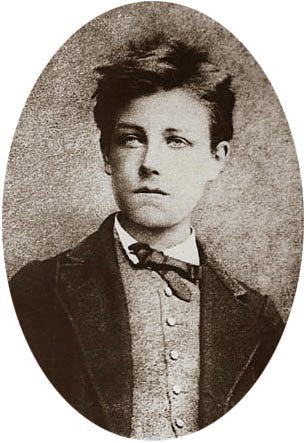
Honte
Tant que la lame n’aura
Pas coupé cette cervelle,
Ce paquet blanc, vert et gras,
À vapeur jamais nouvelle,
(Ah ! Lui, devrait couper son
Nez, sa lèvre, ses oreilles,
Son ventre! et faire abandon
De ses jambes ! ô merveille !)
Mais non, vrai, je crois que tant
Que pour sa tête la lame,
Que les cailloux pour son flanc,
Que pour ses boyaux la flamme
N’auront pas agi, l’enfant
Gêneur, la si sotte bête,
Ne doit cesser un instant
De ruser et d’être traître
Comme un chat des Monts-Rocheux ;
D’empuantir toutes sphères !
Qu’à sa mort pourtant, ô mon Dieu !
Que S’élève quelque prière !
Le Bateau ivre
Comme je descendais des Fleuves impassibles,
Je ne me sentis plus guidé par les haleurs :
Des Peaux-Rouges criards les avaient pris pour cibles
Les ayant cloués nus aux poteaux de couleurs.
J’étais insoucieux de tous les équipages,
Porteur de blés flamands ou de cotons anglais.
Quand avec mes haleurs ont fini ces tapages
Les Fleuves m’ont laissé descendre où je voulais.
Dans les clapotements furieux des marées
Moi l’autre hiver plus sourd que les cerveaux d’enfants,
Je courus ! Et les Péninsules démarrées
N’ont pas subi tohu-bohus plus triomphants.
La tempête a béni mes éveils maritimes.
Plus léger qu’un bouchon j’ai dansé sur les flots
Qu’on appelle rouleurs éternels de victimes,
Dix nuits, sans regretter l’oeil niais des falots !
Plus douce qu’aux enfants la chair des pommes sures,
L’eau verte pénétra ma coque de sapin
Et des taches de vins bleus et des vomissures
Me lava, dispersant gouvernail et grappin
Et dès lors, je me suis baigné dans le Poème
De la Mer, infusé d’astres, et lactescent,
Dévorant les azurs verts ; où, flottaison blême
Et ravie, un noyé pensif parfois descend ;
Où, teignant tout à coup les bleuités, délires
Et rythmes lents sous les rutilements du jour,
Plus fortes que l’alcool, plus vastes que nos lyres,
Fermentent les rousseurs amères de l’amour !
Je sais les cieux crevant en éclairs, et les trombes
Et les ressacs et les courants : Je sais le soir,
L’aube exaltée ainsi qu’un peuple de colombes,
Et j’ai vu quelque fois ce que l’homme a cru voir !
J’ai vu le soleil bas, taché d’horreurs mystiques,
Illuminant de longs figements violets,
Pareils à des acteurs de drames très-antiques
Les flots roulant au loin leurs frissons de volets !
J’ai rêvé la nuit verte aux neiges éblouies,
Baiser montant aux yeux des mers avec lenteurs,
La circulation des sèves inouïes,
Et l’éveil jaune et bleu des phosphores chanteurs !
J’ai suivi, des mois pleins, pareille aux vacheries
Hystériques, la houle à l’assaut des récifs,
Sans songer que les pieds lumineux des Maries
Pussent forcer le mufle aux Océans poussifs !
J’ai heurté, savez-vous, d’incroyables Florides
Mêlant aux fleurs des yeux de panthères à peaux
D’hommes ! Des arcs-en-ciel tendus comme des brides
Sous l’horizon des mers, à de glauques troupeaux !
J’ai vu fermenter les marais énormes, nasses
Où pourrit dans les joncs tout un Léviathan !
Des écroulement d’eau au milieu des bonaces,
Et les lointains vers les gouffres cataractant !
Glaciers, soleils d’argent, flots nacreux, cieux de braises !
Échouages hideux au fond des golfes bruns
Où les serpents géants dévorés de punaises
Choient, des arbres tordus, avec de noirs parfums !
J’aurais voulu montrer aux enfants ces dorades
Du flot bleu, ces poissons d’or, ces poissons chantants.
– Des écumes de fleurs ont bercé mes dérades
Et d’ineffables vents m’ont ailé par instants.
Parfois, martyr lassé des pôles et des zones,
La mer dont le sanglot faisait mon roulis doux
Montait vers moi ses fleurs d’ombres aux ventouses jaunes
Et je restais, ainsi qu’une femme à genoux…
Presque île, balottant sur mes bords les querelles
Et les fientes d’oiseaux clabaudeurs aux yeux blonds
Et je voguais, lorsqu’à travers mes liens frêles
Des noyés descendaient dormir, à reculons !
Or moi, bateau perdu sous les cheveux des anses,
Jeté par l’ouragan dans l’éther sans oiseau,
Moi dont les Monitors et les voiliers des Hanses
N’auraient pas repêché la carcasse ivre d’eau ;
Libre, fumant, monté de brumes violettes,
Moi qui trouais le ciel rougeoyant comme un mur
Qui porte, confiture exquise aux bons poètes,
Des lichens de soleil et des morves d’azur,
Qui courais, taché de lunules électriques,
Planche folle, escorté des hippocampes noirs,
Quand les juillets faisaient crouler à coups de triques
Les cieux ultramarins aux ardents entonnoirs ;
Moi qui tremblais, sentant geindre à cinquante lieues
Le rut des Béhémots et les Maelstroms épais,
Fileur éternel des immobilités bleues,
Je regrette l’Europe aux anciens parapets !
J’ai vu des archipels sidéraux ! et des îles
Dont les cieux délirants sont ouverts au vogueur :
– Est-ce en ces nuits sans fond que tu dors et t’exiles,
Million d’oiseaux d’or, ô future Vigueur ? –
Mais, vrai, j’ai trop pleuré ! Les Aubes sont navrantes.
Toute lune est atroce et tout soleil amer :
L’âcre amour m’a gonflé de torpeurs enivrantes.
Ô que ma quille éclate ! Ô que j’aille à la mer !
Si je désire une eau d’Europe, c’est la flache
Noire et froide où vers le crépuscule embaumé
Un enfant accroupi plein de tristesses, lâche
Un bateau frêle comme un papillon de mai.
Je ne puis plus, baigné de vos langueurs, ô lames,
Enlever leur sillage aux porteurs de cotons,
Ni traverser l’orgueil des drapeaux et des flammes,
Ni nager sous les yeux horribles des pontons.
Arthur Rimbaud
(1854-1891)
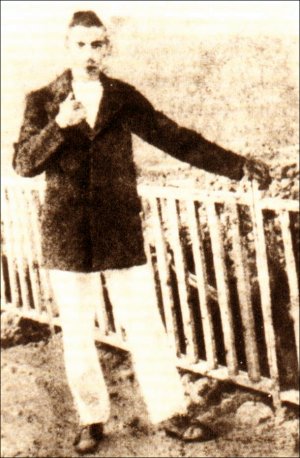
More in: Archive Q-R, Rimbaud, Arthur, Rimbaud, Arthur
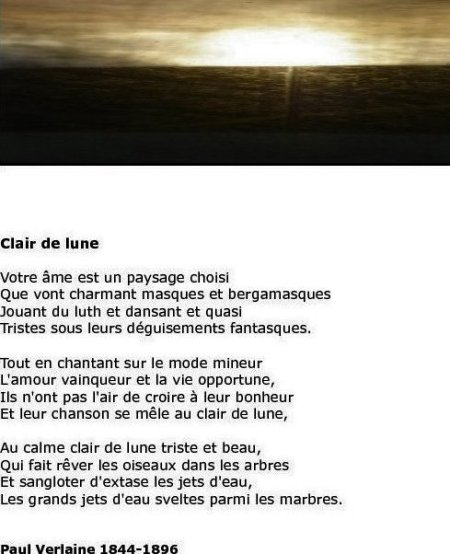
.jpg)
LE ROSSIGNOL
Comme un vol criard d’oiseaux en émoi,
Tous mes souvenirs s’abattent sur moi,
S’abattent parmi le feuillage jaune
De mon coeur mirant son tronc plié d’aune
Au tain violet de l’eau des Regrets,
Qui mélancoliquement coule auprès,
S’abattent, et puis la rumeur mauvaise
Qu’une brise moite en montant apaise,
S’éteint par degrés dans l’arbre, si bien
Qu’au bout d’un instant on n’entend plus rien,
Plus rien que la voix célébrant l’Absente,
Plus rien que la voix,–ô si languissante!–
De l’oiseau qui fut mon Premier Amour,
Et qui chante encor comme au premier jour;
Et, dans la splendeur triste d’une lune
Se levant blafarde et solennelle, une
Nuit mélancolique et lourde d’été,
Pleine de silence et d’obscurité,
Berce sur l’azur qu’un vent doux effleure
L’arbre qui frissonne et l’oiseau qui pleure.
A LA PROMENADE
Le ciel si pâle et les arbres si grêles
Semblent sourire à nos costumes clairs
Qui vont flottant légers avec des airs
De nonchalance et des mouvements d’ailes.
Et le vent doux ride l’humble bassin,
Et la lueur du soleil qu’atténue
L’ombre des bas tilleuls de l’avenue
Nous parvient bleue et mourante à dessein.
Trompeurs exquis et coquettes charmantes
Coeurs tendres mais affranchis du serment
Nous devisons délicieusement,
Et les amants lutinent les amantes
De qui la main imperceptible sait
Parfois donner un soufflet qu’on échange
Contre un baiser sur l’extrême phalange
Du petit doigt, et comme la chose est
Immensément excessive et farouche,
On est puni par un regard très sec,
Lequel contraste, au demeurant, avec
La moue assez clémente de la bouche.
Paul Verlaine
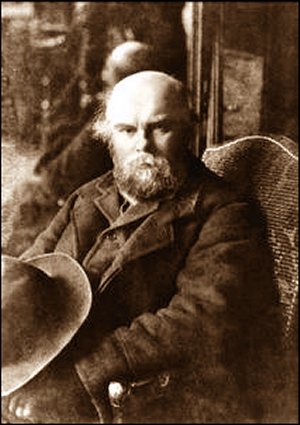
Paul Verlaine (1844-1896)
More in: Verlaine, Paul
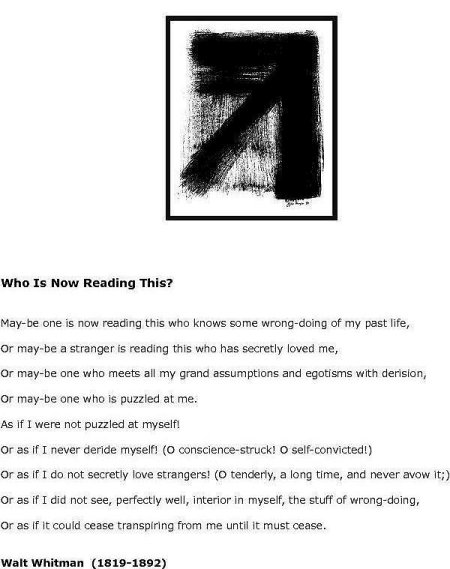

Poets to Come
Poets to come!
orators, singers, musicians to come!
Not to-day is to justify me and answer what I am for,
But you, a new brood, native, athletic,
continental, greater than before known,
Arouse! for you must justify me.
I myself but write one or two indicative words
for the future,
I but advance a moment only to wheel and hurry
back in the darkness.
I am a man who, sauntering along without fully stopping,
turns a casual look upon you and then averts his face,
Leaving it to you to prove and define it,
Expecting the main things from you.
To the Garden the World
To the garden the world anew ascending,
Potent mates, daughters, sons, preluding,
The love, the life of their bodies,
meaning and being,
Curious here behold my resurrection after slumber,
The revolving cycles in their wide sweep
having brought me again,
Amorous, mature, all beautiful to me, all wondrous,
My limbs and the quivering fire that ever plays
through them, for reasons, most wondrous,
Existing I peer and penetrate still,
Content with the present, content with the past,
By my side or back of me Eve following,
Or in front, and I following her just the same.
Tears
Tears! tears! tears!
In the night, in solitude, tears,
On the white shore dripping, dripping, suck’d in by the sand,
Tears, not a star shining, all dark and desolate,
Moist tears from the eyes of a muffled head;
O who is that ghost? that form in the dark, with tears?
What shapeless lump is that, bent, crouch’d there on the sand?
Streaming tears, sobbing tears, throes, choked with wild cries;
O storm, embodied, rising, careering with swift steps along the beach!
O wild and dismal night storm, with wind–O belching and desperate!
O shade so sedate and decorous by day, with calm countenance and
regulated pace,
But away at night as you fly, none looking–O then the unloosen’d ocean,
Of tears! tears! tears!
Walt Whitman
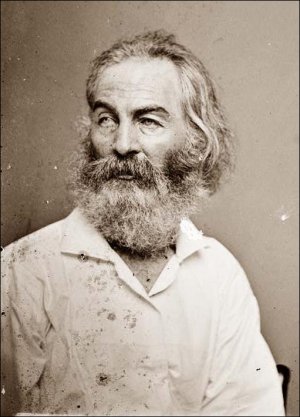
Walt Whitman (1819-1892)
More in: Whitman, Walt
Thank you for reading Fleurs du Mal - magazine for art & literature